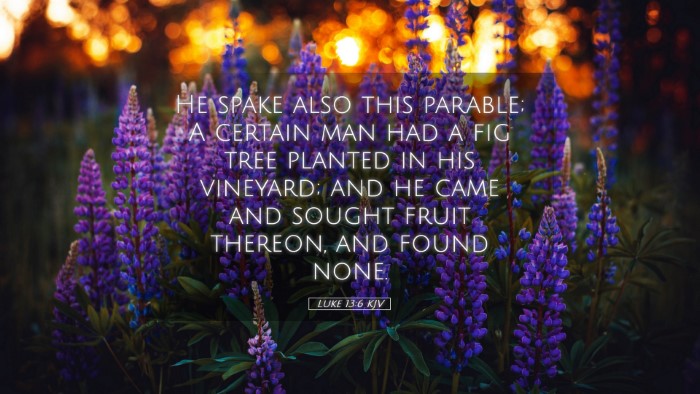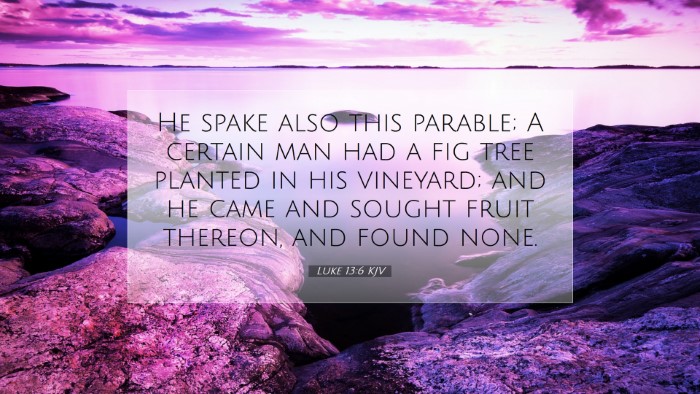Commentary on Luke 13:6
This verse presents a parable delivered by Jesus that reflects the themes of judgment, mercy, and the need for spiritual fruitfulness. Here, Jesus describes a fig tree planted in a vineyard, which represents Israel and, by extension, the human condition regarding God's expectations of us.
Understanding the Parable
In Luke 13:6, Jesus states:
“He spake also this parable; A certain man had a fig tree planted in his vineyard; and he came and sought fruit thereon, and found none.”
This parable reveals several significant insights regarding divine expectations:
- The Owner of the Vineyard: Represents God, who is the ultimate authority and creator of all things.
- The Fig Tree: Symbolizes Israel or the individual believer, highlighting the expectation to bear fruit in accordance with God's will.
- The Absence of Fruit: The failure of the fig tree to produce fruit mirrors Israel's spiritual barrenness and disobedience.
Theology of Judgment
The request for fruit illustrates God's righteousness and His just expectation from His creation. As Matthew Henry observes, this parable demonstrates God's patience and the imminent threat of judgment upon those who fail to respond to His grace:
“The fruit was expected, and its absence warranted the owner's displeasure.”
As Albert Barnes notes, “The vineyard is a place of cultivation, and it is expected that fruit will be borne.” This sets the stage for examining our lives as believers—are we bearing fruit worthy of our calling?
The Mercy of God
The following verses (Luke 13:7-9) reveal the mercy of God in the figure of the gardener pleading for more time to cultivate the tree before it is cut down:
“And he said unto the dresser of his vineyard, Behold, these three years I come seeking fruit on this fig tree, and find none: cut it down; why cumbereth it the ground?”
Adam Clarke elaborates on this plea, highlighting the intercession of Christ on behalf of sinners:
“The figure represents the mediatorial office of Christ, who advocates for those who have fallen short in fruitfulness, pleading for mercy and grace.”
This prayer of intercession presents the depth of Christ's compassion, which resonates deeply with pastors and theologians alike, reminding us that it is through Christ that we receive grace and the opportunity for repentance.
Spiritual Fruitfulness
Ultimately, the message of this parable emphasizes the importance of spiritual fruitfulness in the Christian life. In the context of first-century Israel, this was a direct critique of the unfruitful religious practices that were prevalent among the leaders and the people:
- Fruit of Repentance: Genuine repentance and a change of heart are crucial for producing good works that glorify God.
- Fruit of the Spirit: As described in Galatians 5:22-23, characteristics such as love, joy, peace, patience, kindness, goodness, faithfulness, gentleness, and self-control, are the evidences of a fruitful life.
The call for productivity serves as a reminder for contemporary believers to evaluate their own lives and consider whether they are truly living out their faith.
Application for Believers
This parable challenges both leaders and laypeople within the church. It encourages self-examination, as well as corporate reflection on community practices within the church. As Matthew Henry stresses, a church that does not produce spiritual fruit runs the risk of judgment:
“If the church is barren, she has rightly to fear the hand of God against her.”
Believers are urged to:
- Engage in personal and communal practices that encourage growth and fruitfulness.
- Invest in the cultivation of the deep roots of faith through prayer, study of the Word, and fellowship with other believers.
- Recognize the blessings of God's mercy while also heeding His call to produce fruit worthy of repentance.
Conclusion
In conclusion, Luke 13:6 serves as a profound reminder of God's expectations for His people. The parable of the fig tree challenges us to reflect on our lives and ministries to ensure that they bear fruit for the Kingdom of God. Through reflection on this verse, believers are invited to turn their hearts toward fruitful living that honors God and fulfills His purposes.
This combined insight from the public domain commentaries of Matthew Henry, Albert Barnes, and Adam Clarke offers a holistic view of the urgency of bearing fruit in the life of every believer while embracing the grace and mercy afforded by Jesus Christ.


